It seems to me and to many Wa’pwani that there is a group of Coast MPs and or politicians who are always seen to be very happy to blindly play second fiddle to their up-country counterparts. There is no need for naming names here as these politicians and or individuals know themselves and the people know them too. These individuals are known to be following Raila Odinga like his poodles, and others tag along behind Kalonzo Musyoka. Then they are those who are rallying behind Uhuru Kenyatta simply because they feel indebted to Mzee Jomo Kenyatta and or Daniel arap Moi.
In addition there they are those just because they have been given "senior" national level party positions and are opportunists who are rallying behind NARC Kenya, despite all the indications that the party belong to the people of Mt. Kenya.
This group of politicians have the audacity to shamelessly brand Shirikisho Party of Kenya, the only Coast based party, a tribal party. Although Shirikisho is a regional party, it is by no means a tribal one. Bear in mind that there is nothing wrong for being tribal party, but Shirikisho is not one of them and it should be known as such. A regional party and a tribal one are two different monkeys. A tribal party tends to be restricted to certain regions where the tribe resides, but a regional party cannot necessarily be a tribal one. It is on this background that unlike some other provinces, Coast province is not a homogenous one; hence a regional party cannot be a tribal party in tandem.
A political party is a political organization that seeks to attain political power for its people. It is a vehicle that should poised to usher development for it people and or region. These Coast politicians opposed to Shirikisho must be blind metaphorically and literally for not seeing those perceived to be 'tribal parties' that have successfully been able to bring beef to their people. Excellent examples, Simon Nyachae-led Ford People and the Luhya's own pride Ford Kenya party under the strong leadership of the Local Government minister Musikari Kombo.
If I may ask, where were the Coast MPs when Kombo secured several presidential appointments as a compromise for his party to accept the government proposed list of EALA nominees? Coast legislators were perhaps hiding in other people's parties, suppressed to an extent that they cannot even breathe let alone shout. The funny of it all is that the Coast pick for the EALA slot was not proposed by a Coastal lawmaker but Justice & Constitutional Minister for reason best known to Martha Karua. And to add slat to the injury, none of the Coast legislators knew of Ms. Sakina Sungu Kwekwe before her name was proposed by Karua. Can any Coast MPs dispute this fact?
Label Ford People and Ford Kenya regional and or tribal party or whatever one wants but the fact remain that the two parties have had 'their people' (read tribesmen/women) appointed to important government positions from cabinet to permanent secretaries to ambassadorial and to parastatal heads. Western province, the home base of Ford Kenya has a fully fledged university. Does the Coast have a university yet?
If Shirikisho was tribal party and or Mijikenda party look at the multi-tribal lineup of its national leadership. Apart from ministers Mwakwere and Dzorro, the national Chairman is Mwashengu wa Mwachofi, Secretary General Yussuf Abubakar, Vice Chairman John Safari Mumba --the three individuals are from three different and distinct tribes. And so are Mwakwere and Dzorro.
Finally when it comes to Shirikisho there is this erroneous notion that the Mijikenda people are one tribe. The online Wikipedia dictionary describe the Mijikenda as follows: "The Mijikenda ("the nine cities") are the nine ethnic groups along the coast of Kenya from the border of Somalia in the north to the border of Tanzania in the south. The Mijikenda include the Digo, Chonyi , Kambe, Duruma, Kauma, Ribe, Rabai, Jibana, and Giriama. Each have unique customs and language, although the languages are similar to each other and to Swahili."
Boldly speaking, instead of the Coast politicians catch the moment to join hands and unite for the sake of their people under the Shirikisho banner, they are the first ones disowning the party and praising other people’s parties.
**********______________
In a separate but related story, Shirikisho Party of Kenya is rising as a major player in the emerging political coalitions in the country. President Mwai Kibaki’s friendly parties’ leadership who trying to revive NARC are courting the party and at the same time KANU and the little known Labour Party of Kenya (now with Kalonzo Musyoka) all are seen to be cozying up to Shirikisho to join forces with them in what they refer as the potential third force. For the first term a Coast based political is poised to play an important role in the future government of the country.
All this did not happen out of fluke and is not that surprising at all. Before I go on, I would remind the two senior Shirikisho officials, the secretary general and the vice chairman, Yusuf Abubakar and John Safari Mumba respectively, that they will be fooling themselves if they believe that Shirikisho without Mwakwere, Dzorro, Ananiah Mwaboza, Joseph Kingi, Gonzi Rai and Abdalla Ngozi and their core supporters would have been taken seriously by any coalition groupings. If the two and other officials think so, then they are kidding and fooling themselves concurrently.
It must be remembered that the party was founded in 1997 by a veteran Coast trade unionist Mbwana Warrakah. The vision of the party was attributed to fighting for rights of landlessness and unemployment among the indigenous people. The founders of this party had a vision for the Coast people that have remained unfulfilled. Certain political power hungry people hijacked the party from the original founders, removed them unceremoniously and then messed up the party.
It was for this reason that Shirikisho did not receive the mass support the Warrakah-led party founders had envisaged and were potential to amass. Even before the mess up, the party was able to get its first member of parliament in the same year's general election -- Suleman Shakombo captured the Likoni seat from a KANU incumbent. Seeing a leadership vacuum the Likoni MP tried to hijack the party and imposed himself as the chairman simply because he was the only party legislator. Under pressure from then President Moi, the Likoni MP defected to KANU and almost sold the party to Moi.
In 2002, Shakombo changed political camps from KANU and joined NARC. Despite all odds Shirikisho was able to retain its parliamentary status by successfully sending its second member to the national assembly, this time around for the Magarini seat—Harrison Kombe. This is not what one could call a chequered history, and although not in the “little known league”, Shirikisho has never been taken seriously and was not considered a player in either national or region politics until very recently.
Enter Mwakwere, Dzorro, Mwaboza, Kingi, Ria, Ngozi and their supporters, overnight the party gets a new lease of life by gaining two full cabinet ministers, two assistant ministers and two more MPs. And when you include Kombe, the party has all in all seven legislators.
It must not be forgotten that this same group of legislators pleaded with their then NARC Kenya party not to field a parliamentary candidate in the Magarini by-election. They urged the government allied party to support Shirikisho's candidate where even the Vice President moody Awori trekked to the rural constituency to campaign for Kombe’s re-election. The party is now comparable to other regional parties such as Ford Kenya and Ford People.
Sunday, August 12, 2007
Subscribe to:
Post Comments (Atom)







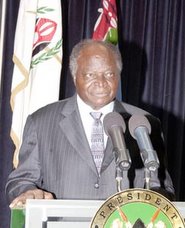


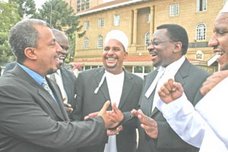
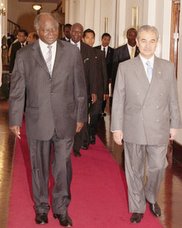

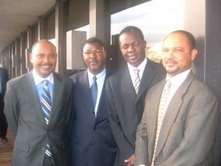
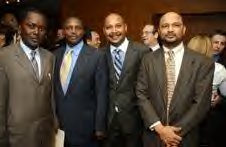
No comments:
Post a Comment